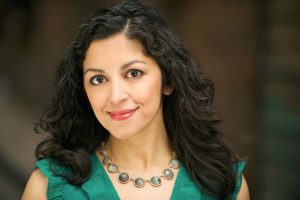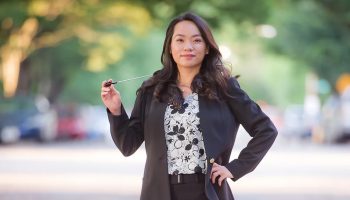
In “The Woman Who Turned Down a Date with a Cherry Farmer,” a poem from Aimee Nezhukumatathil’s 2003 book Miracle Fruit, a narrator remembers a day swelling with “umbrellas of fruit,” “flip-flops and fishhooks” and “ice cubes made of lemonade and sprigs / of mint.”
Within this colorful summer, a cherry farmer approaches the unnamed speaker for a date, receiving what must have been a gentle rejection. What a mistake that was, the narrator admits, looking back.
“I just know my summer would’ve been / full of pies, tartlets, turnovers — so much jubilee.”
The author of five books, including At the Drive-In Volcano, winner of the Balcones Prize; Lucky Fish; and Oceanic, Nezhukumatathil is a poet of natural and common jubilees: mosquitoes, oysters, the names given to people and things. Her work has appeared in the 2015 and 2018 Best American Poetry series, The American Poetry Review and New England Review, and she is currently an English professor specializing in creative writing and environmental literature at the University of Mississippi, where she was the 2016-17 Grisham Writer-in-Residence.
With her children and Dustin Parsons, her husband and fellow writer-in-residence, in tow, Nezhukumatathil has returned to Chautauqua Institution as poet-in-residence at the Chautauqua Writers’ Center for Week Six. She will give her Brown Bag lecture, “Who Said Nights Were for Sleep: The Power of Aubades and Nocturnes,” at 12:15 p.m. Tuesday, July 30 on the porch of the Literary Arts Center at Alumni Hall.
It is around those liminal moments — just after the sun sets and before it rises — that Nezhukumatathil finds the time to “still (her) mind and write.”
“Dusk and dawn are two times of day where the natural world comes alive; as a writer of the outdoors, it serves as a rich backdrop for my own source material and writing,” she said.
“Thrilled” by Nezhukumatathil’s “repeat visitor” status, Atom Atkinson, director of literary arts, was doubly pleased she was willing to travel from Mississippi to the Institution during the week themed “What’s Funny?”
“(Nezhukumatathil) is a really exciting person to have at any time, but especially in a week where people are looking towards the question of where we find the lightness in life,” they said, citing the Week Six Chautauqua Literary and Scientific Circle pick, My Sister, the Serial Killer by Oyinkan Braithwaite, as a literary example of finding “the lightness even in the most dark or troubling of subjects.”
“But with Aimee, I think what she reveals is things we don’t necessarily think of as dark, yet also don’t necessarily think of as funny but can have a lot of lightness inside of them,” they said. “Something like a nature poem — it’s not automatically something we think of as, … maybe a source of joy, but not a source of that particular kind of lightness.”
In a 2015 interview with Divedapper, Nezhukumatathil recalled to writer Kaveh Akbar how her scientific background affected her nature-centric poetry.
“I loved the precision of naming compounds, that everything in biology had specific names, but what I was also drawn to was the musical language and diction of science, and in the margins of my notes for lecture, I’d start scribbling what I know now to be metaphors, or getting distracted by the music of these compounds,” she told Akbar. “I didn’t know it then, but I was actually kind of creating a rhythm from this new vocabulary.”
Her parents, she explained in the interview, worked often, leaving her and her younger sister ro read science books and flex their curiosity for the world outside their home.
“I can remember my father taking me and my younger sister on a hike in the mountains around the Phoenix suburbs, pointing out the names of each of the various cacti and desert flowers we encountered,” she told Akbar. “We’d stop and find bits of quartz crystals or geodes hidden on the trails: such treasures! Saguaro, ocotillo, yellowbell, shrubby bulbines, chuparosa — just try to say those names out loud without smiling. So my ‘writing’ started off, I think, just as a love and a wanting to record what I see in nature. Science will always be one of my very early loves, but I think my greatest gift to humanity was not becoming a doctor.”




